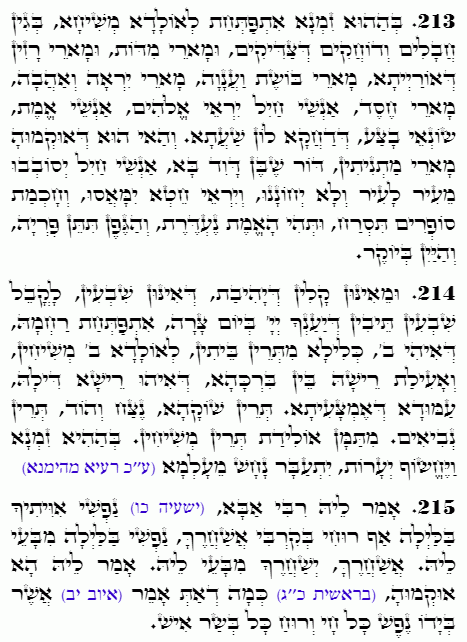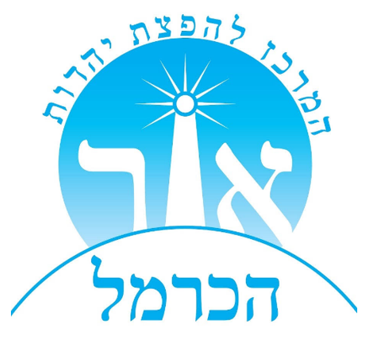Daily Zohar # 4645 – Acharei Mot – Labor pains
Daily Zohar 4645

Hebrew translation:
214. וּמֵאוֹתָם קוֹלוֹת שֶׁהִיא נוֹתֶנֶת, שֶׁהֵם שִׁבְעִים, כְּנֶגֶד שִׁבְעִים תֵּבוֹת שֶׁל יַעַנְךָ ה’ בְּיוֹם צָרָה, נִפְתַּחַת רַחְמָהּ, שֶׁהִיא שְׁתַּיִם, כְּלוּלָה מִשְּׁתֵּי בֵּיתִי”ם, לְהוֹלִיד שְׁנֵי מְשִׁיחִים, וּמַכְנִיסָה אֶת רֹאשָׁהּ בֵּין בִּרְכֶּיהָ, שֶׁהוּא הָרֹאשׁ שֶׁלָּהּ, הָעַמּוּד הָאֶמְצָעִי. שְׁתֵּי שׁוֹקֶיהָ, נֵצַח וְהוֹד, שְׁנֵי נְבִיאִים. מִשָּׁם מוֹלִידָה שְׁנֵי מְשִׁיחִים. בְּאוֹתוֹ זְמַן וַיֶּחֱשֹׂף יְעָרוֹת, יָעֳבַר הַנָּחָשׁ מֵהָעוֹלָם. (עד כאן רעיא מהימנא).
215. אָמַר לוֹ רַבִּי אַבָּא, (ישעיה כו) נַפְשִׁי אִוִּיתִךָ בַּלַּיְלָה אַף רוּחִי בְקִרְבִּי אֲשַׁחֲרֶךָּ. הָיָה צָרִיךְ לִהְיוֹת נַפְשִׁי אִוְּתָךְ בַּלַּיְלָה! אֲשַׁחֲרֶךָּ?! יְשַׁחֲרֶךָּ הָיָה צָרִיךְ לִהְיוֹת! אָמַר לוֹ, הֲרֵי פֵּרְשׁוּהָ, כְּמוֹ שֶׁנֶּאֱמַר (איוב יב) אֲשֶׁר בְּיָדוֹ נֶפֶשׁ כָּל חָי וְרוּחַ כָּל בְּשַׂר אִישׁ.
.
Zohar Acharei Mot
Continued from previous DZ
#213
In that time, she (the Shechinah) opens to give birth to the Mashiach due to the suffering and distress of the Tzadikim—those who possess virtues, those who hold the secrets of the Torah, those who have humility and modesty, those who possess awe and love of God, those who practice Chassadim, men of valor, God-fearing people, people of truth, and haters of greed—who are pressed by the hardship of the time. This is what the Sages of the Mishnah established: in the generation when the son of David (the Mashiach) comes, men of valor will go from city to city and not be shown compassion, and those who fear sin will be despised, the wisdom of the scribes will rot, and the truth will be absent. The vine will give its fruit, and the wine will be expensive.
Notes:
The hardships that will precede the arrival of the Mashiach portray a world where righteous individuals—those who embody humility, love, fear of Hashem, and kindness—suffer greatly. Despite their virtues, they face persecution and hardship, which paradoxically hastens the birth of the Mashiach.
This highlights the moral and spiritual decline that will mark the generation before the Mashiach’s arrival. Tzadikim will wander without receiving kindness, those who fear sin will be rejected, wisdom will be disregarded, and truth will be absent. Despite the physical abundance (symbolized by the vine giving fruit), there will be spiritual and material scarcity (as the wine will be costly). These dire circumstances will act as labor pains, preparing the world for the redemptive birth of the Mashiach.
#214
From these voices of pain that she gives—seventy voices, corresponding to the seventy words in Psalm 20, “יַעַנְךָ ה’ בְּיוֹם צָרָה” “May YHVH answer you in the day of trouble,” Her womb opens, which is represented by the letter ‘ב’ ‘Bet,’ symbolizing the house (בית) of the womb that consists of two parts, from which will be born the two Mashiachs: Mashiach ben David and Mashiach ben Yosef. She brings her head between her knees. Her head is the middle column, Zeir Anpin, and her knees are the two thighs, Netzach and Hod, two prophets. From there, the two Mashiachs are born, as mentioned above. At that time, He will “וַיֶּחֱשֹׂף יְעָרוֹת” “uncovers the forests,” meaning the revelation of Chokmah, and the Snake will be removed from the world because the light of Chokmah consumes all the klipot.
Notes:
This paragraph draws on the imagery of birth and Final Redemption. The Shechinah, representing the collective soul of Israel, experiences “labor pains” symbolized by the seventy voices (corresponding to the seventy words in Psalm 20), leading to the birth of the two Mashiachs (ben David and ben Yosef). Mashiach ben Yosef represents a preparatory process of redemption, often associated with struggle, while Mashiach ben David brings the ultimate redemption.
The imagery of the “head between the knees” symbolizes Zeir Anpin, representing the central column of the Tree of Life, surrounded by Netzach and Hod, referred to as the two legs, or the prophets, which facilitate the birth of the Mashiach. The phrase “He will uncover the forests” refers to revealing the hidden wisdom (Chokmah), which was previously concealed. This revelation of Chokmah will illuminate the world and remove the concealment brought by the negative forces, the Snake. Uncovering the “forests” signifies the opening of the channels of wisdom before the Final redemption.
At this time, the levels of Netzach and Hod represented as the legs or prophets, will give birth to Mashiach ben David and Mashiach ben Joseph, who are essential in the process of redemption. The removal of the Snake from the world indicates the destruction of the forces of evil, as the light of Chokmah will dispel all darkness and nullify the existence of spiritual impurities.
This vision, connected to the Mashiach era, illustrates how Hashem will facilitate the birth of redemption through unity with Zeir Anpin, along with the revelation of Chokmah, thereby leading to the Final Redemption.
#215
Rabbi Abba said to him:
Isaiah 26:9
“נַפְשִׁי אִוִּיתִיךָ בַּלַּיְלָה אַף רוּחִי בְקִרְבִּי אֲשַׁחֲרֶךָּ כִּי כַּאֲשֶׁר מִשְׁפָּטֶיךָ לָאָרֶץ צֶדֶק לָמְדוּ יֹשְׁבֵי תֵבֵל.”
“With my soul, I have desired You in the night, Yes, by my spirit within me I will seek You early; For when Your judgments are in the earth, The inhabitants of the world will learn righteousness.”
He asks, “It should have said, ‘My soul in the night’ and ‘even my spirit within me seeks You.’ Similarly, it should have said ‘he seeks You,’ since it is referring to his spirit.” Rabbi Abba answered him, “It has already been explained, as it says,
Job 12:10
“אֲשֶׁר בְּיָדוֹ נֶפֶשׁ כָּל חָי וְרוּחַ כָּל בְּשַׂר אִישׁ.”
“In whose hand is the soul (life) of every living thing, And the breath of all mankind (flesh)?”
This means that when it says ‘my soul’ and ‘my spirit,’ it does not refer to himself but to the two lights—Ruach and Nefesh—that are dressed within the body, as will be explained further.
Notes:
This section delves into the deeper meaning of the terms ‘Nefesh’ (soul) and ‘Ruach’ (spirit), explaining that they are lights granted by the Creator that exist within all beings.
Friday is an ideal time to give, especially if you haven’t had the chance to donate this week. By donating on Friday, connected to the energy of Yessod, you open yourself to receive greater Light in honor of Shabbat.
Donation
Remember, your donation doesn’t need to go to the same place each time. Feel free to alternate or share your contribution among the sources that nurture you spiritually. Your generosity helps expand your spiritual vessel.
 Support Ohr HaCarmel Yeshiva
Support Ohr HaCarmel Yeshiva
Tap here to visit the Ohr HaCarmel Donation Page, where you can make a meaningful contribution while forging a spiritual connection to Israel.
Ohr HaCarmel Yeshiva, meaning “The Light of the Carmel,” is situated atop Mount Carmel—the very place where the prophet Elijah’s prayers were answered.

 Previous: Acharei Mot
Previous: Acharei Mot

